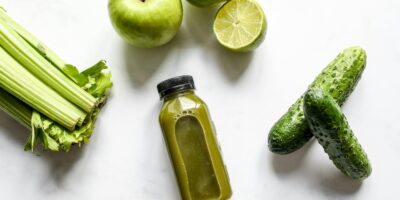Optimising your Gut Health this Winter
Did you know that over 70% of our immune cells are located within our gut?
So, prioritising our gut health during the cold and flu season is essential! During the winter months we can forget to look after ourselves and as a result, our gut health can really suffer. High stress, poor sleep, lack of nutrition and lack of physical activity can lead to an imbalance within our microbiome which can not only exacerbate IBS but it can wreak havoc on our immune system too.
Below is our guide to optimising your gut health to give you the best chance at keeping well this winter.
You can download the full guide HERE
Manage those winter blues
Our brain and our gut are connected via the vagus nerve which sends signals in a bi-directional flow. Low mood, depression, anxiety and high stress exacerbate IBS symptoms and vice versa. Stress weakens our immune system and alters our microbiome resulting in dysbiosis (1).
So what can you do this winter to beat those winter blues:
- Stay connected with friends and family
- Engage in activities that bring joy into your life e.g. art and crafts, baking, socialising, sports or reading.
- Go outside and see the daylight every day
- Try some relaxation techniques such as diaphragmatic breathing, listening to calming music, mindfulness, yoga or lighting a few candles and taking a bath.
- Include light to moderate physical activity and ensure this is an activity you enjoy
- Reach out for professional support from a psychologist or counsellor if you are struggling.
Get your 8 hours of sleep
Research shows that poor sleep is correlated with greater IBS symptoms (2). On the other hand, good sleep promotes proper digestion and absorption of nutrients, supporting a healthy gut.
Here are some tips to getting a good night’s rest:
- Establish a regular sleep schedule and wind down with relaxing activities like reading, meditating, or taking a warm bath or hot shower.
- Make your sleep sanctuary cozy and inviting. Invest in a comfortable mattress, keep your room cool and dark, and minimise the use of blue light on devices 1-2 hours before sleeping.
- Avoid heavy meals and caffeine close to bedtime. Opt for gut-friendly foods like fiber-rich fruits and veggies, wholegrains, and lean proteins.
- Engaging in regular physical activity not only helps tire you out, but it also promotes better sleep quality. Avoid high impact workouts close to bedtime, as they can have the opposite effect.
Aim for 30 different plant based fibers per week
Research shows that those who eat 30 different types of plant fibers per week have a more diverse gut microbiome (3). The more diverse our microbiome, the less likely we are to experience IBS type symptoms such as bloating, constipation, diarrhoea and stomach pain. To achieve this, eat a variety of fruits, vegetables, nuts, seeds, grains, herbs and spices each day.
Here are some tips on how you can boost your plant fibers:
- Include frozen and canned fruits and vegetables.
- Flavour your meals with herbs and spices. Hint: our spice mixes will provide you with over 7 different herbs and spices within one meal.
- Snack on nuts and seeds or add them to winter salads for extra crunch. Some low FODMAP options include walnuts, peanuts, almonds, pumpkin seeds, chia seeds, linseeds and sesame seeds.
- Include a variety of wholegrains at meals and snacks such as rice, quinoa, sourdough bread and oats.
- Add low FODMAP serves of legumes into meals for added fibre. E.g. lentils to mince dishes, chickpeas to curries and split peas to soups. Pro tip: rinse your canned legumes to wash off the FODMAPs that leach out into the brine before eating.
Move your body
There are studies to show exercise has a direct beneficial effect on gut microbiome diversity (4)(5). Movement also moves gas and bowel contents along the digestive tract which can reduce constipation and relieve bloating. Furthermore, keeping active helps to reduce and manage stress and improve mental health with those endorphins, and we all know about that gut-brain connection.
Here are some tips to staying active this winter:
- Movement doesn’t have to always be at the gym, it includes activities such as gardening, dancing or running around with your kids.
- Join a group class such as dance, Pilates, boxing, or Zumba or see if there is a social sports team you could join.
- Prioritise restorative movement that helps to reduce stress and calm the gut. We love yoga and gentile walks for this.
- Limit strenuous exercise, especially when stressed or during and IBS flare up. This will only increase cortisol levels and exacerbate your IBS.
Support your gut with probiotics
Probiotics are a great way to give your gut that little extra support it might need. We are big believers in always choosing food first for additional nutrients. Some probiotic rich foods include yoghurt (note coconut yoghurt often doesn’t contain probiotics), miso paste, fermented foods and probiotic cheeses.
We understand it’s not always possible for everyone to eat these foods, in which case you may benefit from a probiotic supplement. The world of probiotics can be a confusing one, as there are many different strains, each designed for a different purpose so it is important you choose one that is specific to your needs. It often takes about 3-4 weeks to notice any difference after taking probiotics and they must be taken daily to have any effect.
See our full guide HERE for some examples of probiotic strains that may be beneficial for people with IBS.
Published: 23rd March 2023
Author: Bianca Berton-Scarlet Monash FODMAP trained Dietitian





Comments (0)